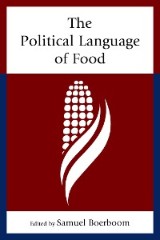Details

The Political Language of Food
|
57,99 € |
|
| Verlag: | Lexington Books |
| Format: | EPUB |
| Veröffentl.: | 06.05.2015 |
| ISBN/EAN: | 9781498505567 |
| Sprache: | englisch |
| Anzahl Seiten: | 282 |
DRM-geschütztes eBook, Sie benötigen z.B. Adobe Digital Editions und eine Adobe ID zum Lesen.
Beschreibungen
<span><span>The Political Language of Food</span><span> addresses why the language used in the production, marketing, selling, and consumption of food is inherently political. Food language is rarely neutral and is often strategically vague, which tends to serve the interests of powerful entities.Boerboom and his contributors critique the language of food-based messages and examine how such language—including idioms, tropes, euphemisms, invented terms, etc.—serves to both mislead and obscure relationships between food and the resulting community, health, labor, and environmental impacts. Employing diverse methodologies, the contributors examine on a micro-level the textual and rhetorical elements of food-based language itself. </span><span>The Political Language of Food </span><span>is both timely and important and will appeal to scholars of media studies, political communication, and rhetoric. </span></span>
<span><span>This edited collection explores how food language is political. The contributors examine the production of food language in conjunction with historical social movements, food labeling practices, illustrations of social class, as well as corporate and bureaucratic language.<br></span></span>
<span><span>Introduction: How does food language function politically?</span></span>
<br>
<span><span>Samuel Boerboom</span></span>
<br>
<span></span>
<br>
<span><span>Chapter 1Tracing the “Back to the Land” Trope: Self-Sufficiency, Counterculture, and Community</span></span>
<br>
<span><span>Jessica M. Prody</span></span>
<br>
<span></span>
<br>
<span><span>Chapter 2 Végétariens Radicaux: John Oswald and the Trope of Sympathy in Revolutionary Paris</span></span>
<br>
<span><span>Justin Killian</span></span>
<br>
<span><span> </span></span>
<br>
<span><span>Chapter 3 The Revolution Will Not Be (Food) Reviewed: Politics of Agitation and Control of Occupy Kitchen</span></span>
<br>
<span><span>Amy Pason</span></span>
<br>
<span></span>
<br>
<span><span>Chapter 4 Haute Colonialism: Exocitizing Povery in </span><span>Bizarre Foods America</span></span>
<br>
<span><span>Casey Ryan Kelly</span></span>
<br>
<span></span>
<br>
<span><span>Chapter 5 Pungent Yet Problematic: The Class-Based Framing of Ramps in the</span><span> New York Times</span><span> and the </span><span>Charleston Gazette</span></span>
<br>
<span><span>Melissa Boehm</span></span>
<br>
<span></span>
<br>
<span><span>Chapter 6Constructing Taste and Waste as Habitus: Food and Matters of Access and In/Security</span></span>
<br>
<span><span>Leda Cooks</span></span>
<br>
<span></span>
<br>
<span><span>Chapter 7Tying the Knot: How Industry and Advocacy Organizations Market Language as Humane</span></span>
<br>
<span><span>Joseph L. Abisaid</span></span>
<br>
<span><span> </span></span>
<br>
<span><span>Chapter 8Corn Allergy: Public Policy, Private Devastation</span></span>
<br>
<span><span>Kathy Brady</span></span>
<br>
<span><span> </span></span>
<br>
<span><span>Chapter 9 Family Farms with Happy Cows: A Narrative Analysis of Horizon Organic Dairy Packaging Labels</span></span>
<br>
<span><span>Jennifer L. Adams</span></span>
<br>
<span></span>
<br>
<span><span>Chapter 10</span><span>Chipotle Mexican Grill’s</span><span> Meatwashing Propaganda: Corporate-Speak Hiding Suffering of “Commodity” Animals</span></span>
<br>
<span><span>Ellen W. Gorsevski</span></span>
<br>
<span></span>
<br>
<span><span>Chapter 11Corporate Colonization in the Market: Discursive Closures and the Greenwashing </span></span>
<br>
<span><span>of Food Discourse</span></span>
<br>
<span><span>Megan A. Koch and Cristin A. Compton</span></span>
<br>
<span><span> </span></span>
<br>
<span><span>Chapter 12Mistaken Consensus and the Body-as-Machine Analogy</span></span>
<br>
<span><span>Samuel Boerboom</span></span>
<br>
<span><span>Samuel Boerboom</span></span>
<br>
<span></span>
<br>
<span><span>Chapter 1Tracing the “Back to the Land” Trope: Self-Sufficiency, Counterculture, and Community</span></span>
<br>
<span><span>Jessica M. Prody</span></span>
<br>
<span></span>
<br>
<span><span>Chapter 2 Végétariens Radicaux: John Oswald and the Trope of Sympathy in Revolutionary Paris</span></span>
<br>
<span><span>Justin Killian</span></span>
<br>
<span><span> </span></span>
<br>
<span><span>Chapter 3 The Revolution Will Not Be (Food) Reviewed: Politics of Agitation and Control of Occupy Kitchen</span></span>
<br>
<span><span>Amy Pason</span></span>
<br>
<span></span>
<br>
<span><span>Chapter 4 Haute Colonialism: Exocitizing Povery in </span><span>Bizarre Foods America</span></span>
<br>
<span><span>Casey Ryan Kelly</span></span>
<br>
<span></span>
<br>
<span><span>Chapter 5 Pungent Yet Problematic: The Class-Based Framing of Ramps in the</span><span> New York Times</span><span> and the </span><span>Charleston Gazette</span></span>
<br>
<span><span>Melissa Boehm</span></span>
<br>
<span></span>
<br>
<span><span>Chapter 6Constructing Taste and Waste as Habitus: Food and Matters of Access and In/Security</span></span>
<br>
<span><span>Leda Cooks</span></span>
<br>
<span></span>
<br>
<span><span>Chapter 7Tying the Knot: How Industry and Advocacy Organizations Market Language as Humane</span></span>
<br>
<span><span>Joseph L. Abisaid</span></span>
<br>
<span><span> </span></span>
<br>
<span><span>Chapter 8Corn Allergy: Public Policy, Private Devastation</span></span>
<br>
<span><span>Kathy Brady</span></span>
<br>
<span><span> </span></span>
<br>
<span><span>Chapter 9 Family Farms with Happy Cows: A Narrative Analysis of Horizon Organic Dairy Packaging Labels</span></span>
<br>
<span><span>Jennifer L. Adams</span></span>
<br>
<span></span>
<br>
<span><span>Chapter 10</span><span>Chipotle Mexican Grill’s</span><span> Meatwashing Propaganda: Corporate-Speak Hiding Suffering of “Commodity” Animals</span></span>
<br>
<span><span>Ellen W. Gorsevski</span></span>
<br>
<span></span>
<br>
<span><span>Chapter 11Corporate Colonization in the Market: Discursive Closures and the Greenwashing </span></span>
<br>
<span><span>of Food Discourse</span></span>
<br>
<span><span>Megan A. Koch and Cristin A. Compton</span></span>
<br>
<span><span> </span></span>
<br>
<span><span>Chapter 12Mistaken Consensus and the Body-as-Machine Analogy</span></span>
<br>
<span><span>Samuel Boerboom</span></span>
<span><span>Samuel Boerboom</span><span> is assistant professor of media studies in the Department of Communication and Theatre at Montana State University Billings. </span></span>
<br>
<span></span>
<br>
<span></span>

















